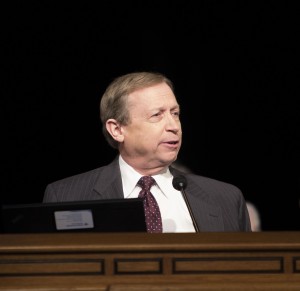The executive director of a health institute told BYU students the recently passed bill on healthcare reform is nothing more than health insurance reform during a Forum on March 18.

Brent C. James, executive director of the Institute for Health Care Delivery Research, said healthcare does not mean good health. He introduced the “great equation,” the commonly held theory that good health equals medical care, and medical care means access to care, which equals health insurance.
“The ‘great equation’ is fundamentally wrong,” James said. “The evidence doesn’t support the conclusions associated with that key point.”
James defined the four factors that truly do influence life expectancy, along with the percent impact they have on a person’s overall health:
- 40 percent — behavior
- 30 percent — genetics
- 20 percent — environment/public health
- 10 percent — healthcare delivery
James said life expectancy actually relies heavily on how one lives one’s life. He used the Word of Wisdom as an example. Members of The Church of Jesus Christ of Latter-day Saints who live the Word of Wisdom are likely to have better health because of their “behavior” choices to abstain from harmful substances or activity and participating in healthy eating and exercise. He conducted a study showing “religiously active” LDS men in the U.S. live seven years longer than their non-LDS neighbors.
James said national debate around healthcare has really focused on “rescue care,” which he defined as “the imperative people feel to rescue identifiable individuals facing or suffering death.”
“When it comes to rescue care, the United States dominates the world,” James said.
In contrast to “rescue care,” which does not actually improve average life expectancy, James gave an example of how he has implemented real healthcare reform at Intermountain Healthcare. He has saved money and lives because he standardized medical procedures for his patients while encouraging other professionals to individualize plans for patients’ needs.
Natalie Reynolds, a senior studying genetics and biotechnology, listened closely to James because of her aspiring desire to become a physician and healthcare’s influence on physicians’ jobs.
“While there are lots of problems in the healthcare reform and the system we have today, there are also more solutions than I knew about before,” Reynolds said. “There is more hope for the future than I realized as well as specific clinical things that physicians can be doing today to help reduce the cost of health care.”
A Q&A for staff and students was held following the Forum.
Mark Frost, a current BYU student studying exercise and wellness, asked, “What can we do right now and in the future to make a difference in healthcare?”
James told students to join the medical world and make a difference. He said to prepare well by living the Word of Wisdom, not just the temple recommend aspects of the Word of Wisdom, but rather making it a lifestyle by dieting and exercise. James encouraged students to live a life that doesn’t lead to medicine because of poor health.
“I want to tell you, I believe the practice of medicine is the finest profession God ever gave the earth,” James said. “It’s an opportunity on a daily basis to be a true service as you get to participate, and sometimes officiate, in some of life’s most important transitions.”
Next week’s Devotional address will be given by Chad Lewis, from BYU athletics, on March 25 in the Marriott Center at 11:05 a.m.




